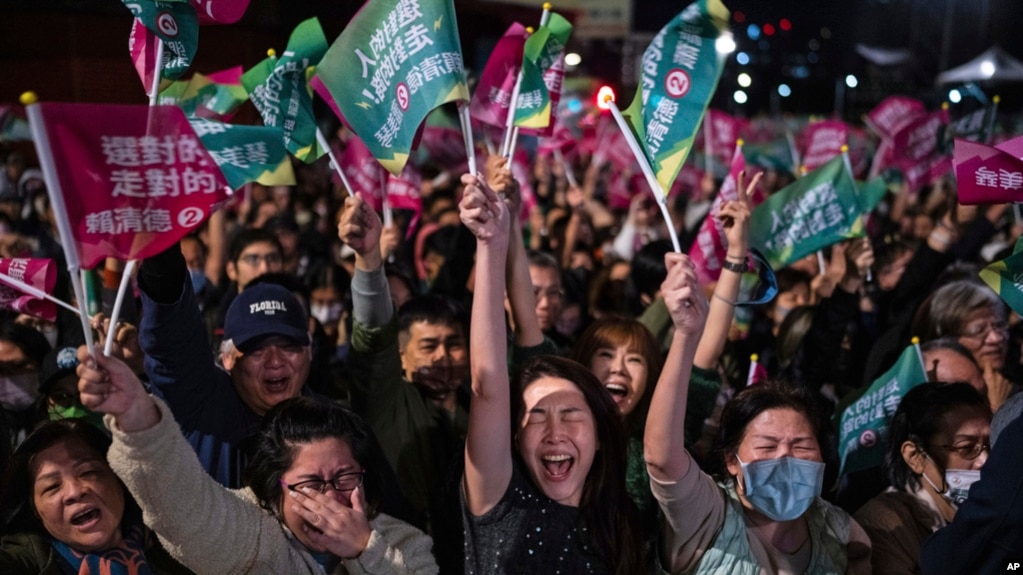
The crowd cheers at a Democratic Progressive Party rally in Taipei, Taiwan, Jan. 13, 2024. The ruling DPP party candidate Lai Ching-te emerged victorious in Taiwan’s presidential election.
Washington —
Judicial investigators in Taiwan have indicted a couple affiliated with a small political party on charges of receiving millions of dollars from Chinese authorities to promote the Chinese government’s political agenda and influence Taiwan’s elections and referendums.
Taiwan’s Chiayi District Prosecutors’ Office said Monday it has charged Chang Meng-chung and his wife, Hung Wen-ting, with violating Taiwan’s Anti-Infiltration Act and election laws by making radio and digital media propaganda for Beijing in exchange for NT$74 million, approximately $2.32 million, paid out over more than a decade.
Prosecutors allege China’s Taiwan Affairs Office in Beijing and the TAO branch office in China’s Fujian Province paid the couple between 2011 and 2023 to promote candidates favored by Beijing, disparage Hong Kong democracy activists and members of the Falun Gong spiritual group, boast about China’s military power, and urge Taiwan’s troops to surrender in the event of China’s invasion.
Beijing considers Taiwan a breakaway province that must one day reunite with the mainland, by force if necessary, and carries out frequent military drills around the self-governing island to assert its claim. Most Taiwanese oppose rejoining China.
Chang and Hung are members of the China Unification Promotion Party, or CUPP, a small Taiwanese political party that Reuters reports has about 60,000 members and promotes Taiwan’s unification with the mainland.
Prosecutors allege the couple went to mainland China many times to provide program summaries and plans for Chinese authorities’ review.
In a response to the charges broadcast by multiple Taiwanese TV stations, Chang said, "Taiwan says it\’s democratic, but it\’s not democratic at all. The CUPP has always been championing cross-strait reunification, so what I said is the same as what the CUPP has always advocated."
According to a report by Taiwan’s Central News Agency, if found guilty, the couple could face up to five years in prison and a fine of up to NT$10 million, roughly $313,400.
Chao Fang-yi, a non-resident fellow at the Research Institute of Democracy, Security, and Emerging Technology in Taiwan, told VOA Mandarin that the use of the Anti-Infiltration Act, which came into effect in January 2020, was significant because authorities have struggled in the past to connect CUPP finances to China.
"Actually, if China wants to give them money, it may be in a very obscure way, and it may be difficult to trace it,” said Chao. “So, this time, there is clear evidence so it can be prosecuted. I think it\’s also a pretty powerful thing."
Taiwan authorities have long sought to prosecute CUPP’s founder Chang An-lo, also known as the “White Wolf,” who had links to organized crime. Chang was imprisoned for 10 years in the U.S. in the 1980s for drug trafficking and then lived in exile for 17 years in China before returning to the island in 2013 and turning himself in to authorities. But charges of organized crime were later dropped.
Taiwanese police in 2018 raided Chang An-lo’s house and CUPP headquarters to look for evidence of funding from Beijing, which Chang denied. Charges that he violated a political donation law were dropped in July 2024, but Chang was sentenced to eight months in prison for forging documents and tax violations.
In August, Taiwan’s High Prosecutors’ Office charged three Taiwanese affiliated with CUPP with developing a spy network to infiltrate the Taiwanese military.
The Investigation Bureau of Taiwan’s Ministry of Justice said in its statement Monday that authorities investigating Chang Meng-chung and his wife searched 24 locations between December 2023 and July of this year. The bureau said it seized mobile phones, computers, financial records and other evidence.
The bureau and prosecutor\’s office said the Chinese Communist Party (CCP) on the mainland has taken advantage of Taiwan\’s democratic freedoms to instruct, entrust or fund domestic collaborators to carry out infiltration and division and spread disinformation against Taiwan to manipulate and interfere in its elections and national security.
VOA has not seen any comments on the arrests from China’s Taiwan Affairs Office of the CCP Central Committee or the Taiwan Affairs Office of China’s State Council, Bejing’s relevant authorities who speak on Taiwan issues, by the time of publication.
Adrianna Zhang from VOA Mandarin Service contributed to this story.
By:VOA


